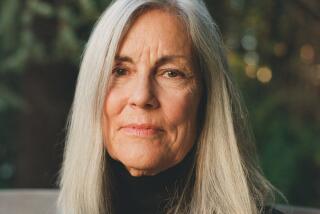KCAL Plans Two Risky Series During Current Sweeps Period
- Share via
Over the past 15 years, KCAL-TV news anchor Pat Harvey has reported on the lives of poverty-stricken citizens of far-flung countries. But nothing the Emmy Award-winning broadcaster has done prepared her for her latest assignment--covering AIDS and the tradition of female genital mutilation in Africa.
“Going into this, I’m thinking--I’ve seen devastating poverty in smaller [South African] townships. . . . I covered sex and AIDS in Russia. . . . I’ve been to El Salvador during the war. I’ve seen the poverty,” Harvey said. “That was not the case. This was much more devastating.”
Starting tonight at 8 on KCAL’s evening newscast, Harvey will introduce the first of two timely and somewhat risky series focusing on her experience. One deals with Africa’s AIDS crisis, and one looks at the tradition of female genital mutilation and the women attempting to educate their tribe members on the ceremony’s dangers.
The intense series will air during television’s most competitive time: the ratings sweeps. Typically, local stations are averse to such a potentially disturbing report during sweeps, as news directors try to herd in viewers with provocative but proven stories.
In May, Nielsen Media Research ranked KCAL third in the market for its 10 p.m. newscast, and the independent station’s news director, Doug Herzig, knows he’s taking a chance by dedicating a total of six nights to the Africa stories.
“We have dedicated serious money and serious time to a serious story,” he said. “It is a different strategy to what a television station does during a ratings period.”
Harvey was less subtle.
“The female genital mutilation story was one of the most uncomfortable stories I’ve ever done,” she said, seated in Herzig’s office late last week. “Having not seen one--just listening to accounts of it--I was twitching throughout the entire interview.”
For 10 days Harvey traveled through Africa with a photographer and her producer, Kimberly Cornell. They relied on a knowledgeable driver, and contact information from the Los Angeles-based Pacific Institute for Women’s Health and Doctors Without Borders, a worldwide medical assistance agency that was awarded a Nobel Peace Prize in 1999.
Harvey and her two colleagues spent the first part of their trip investigating the ravages of AIDS. Uganda has been cursed with a two-year drought that has only exacerbated poverty and made living conditions for those afflicted with HIV or AIDS nearly intolerable. The government of Uganda is attempting to curb infection rates with billboard campaigns that encourage safe sex.
“It’s not the drugs,” Harvey said. “They don’t have the money for that. Sex is the major force. Men have multiple wives--which is legal in Africa--and . . . they don’t really like to talk about it.”
In Nairobi, the KCAL crew came to a filthy slum of 1.5 million people, 20% of whom are infected with HIV or AIDS. In the middle of the shantytown, Harvey was surprised to see a nondescript schoolhouse where a group of AIDS counselors attended to the ill.
The most heartbreaking day for her occurred at an orphanage of nearly 70 children with AIDS who are cared for by a priest and two volunteers. Each month two or three tiny crosses appear in the small plot of land that has been designated a burial site for the orphans.
“I’m a mother,” Harvey said. “Quite frankly, to witness children dying from such a horrible disease and to face poverty [at the same time] affected me deeply.”
The female genital mutilation story was suggested by Cornell, the producer. A small but significant group of tribal women are determined to shield their daughters and granddaughters from the practice. One woman, Agnes, who appears to be in her 50s, underwent the painful and dangerous “circumcision” when she was 14. But her daughter is now studying at college and never experienced the cutting ceremony.
Agnes, whose husband has another wife, told Harvey she is too busy to “think about” the tradition of multiple wives while educating fellow tribe members about female circumcision.
“For her to go around in these remote villages and talk about the dangers of [female circumcision], and question why it’s done today, is very courageous,” Harvey said.
*
* The AIDS series will air tonight through Wednesday during KCAL’s 8 and 10 p.m. newscasts. The series on female genital mutilation will air at 10 on Nov. 27, and at 8 and 10 p.m. on Nov. 28 and 29.
More to Read
The complete guide to home viewing
Get Screen Gab for everything about the TV shows and streaming movies everyone’s talking about.
You may occasionally receive promotional content from the Los Angeles Times.





